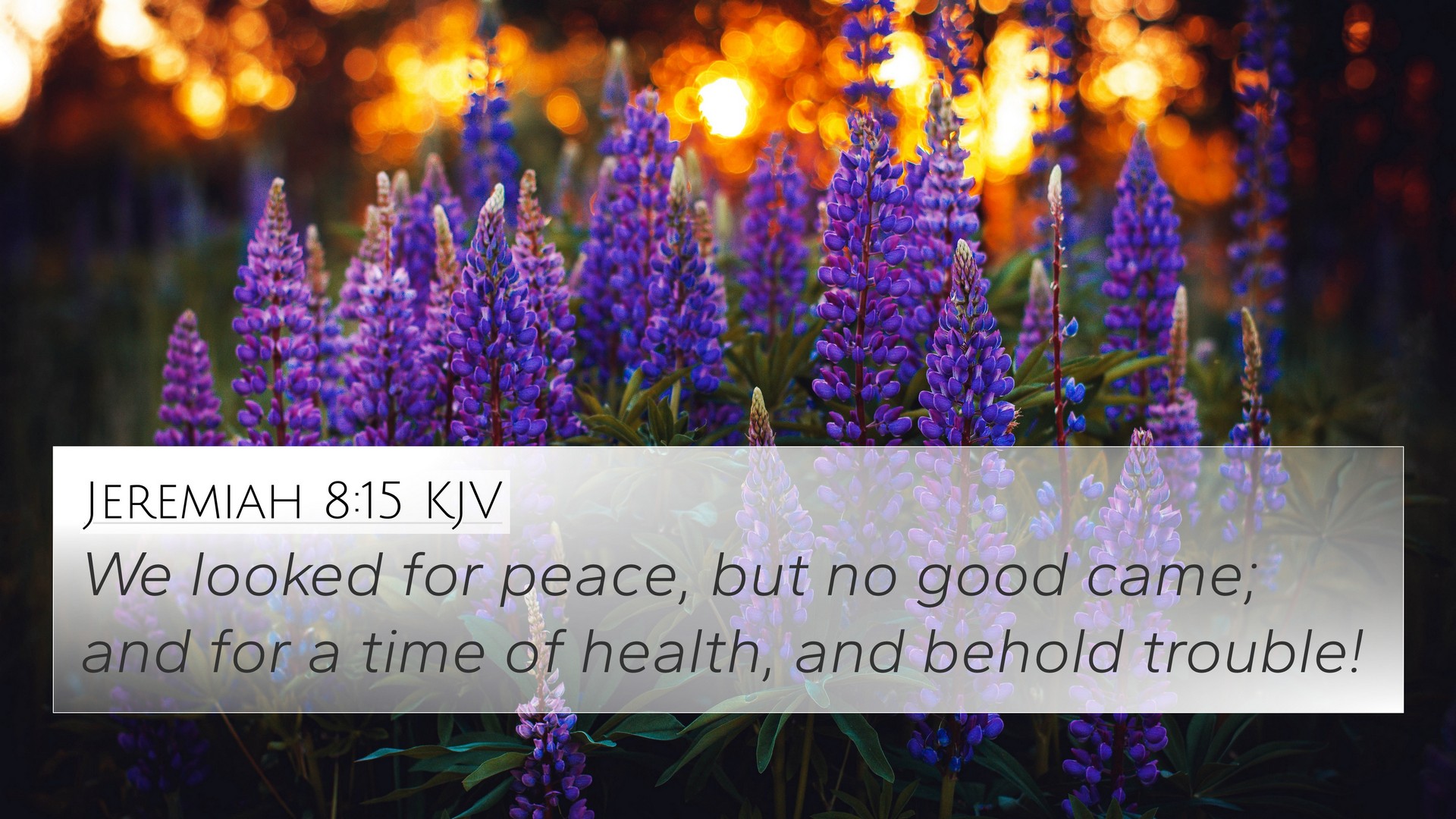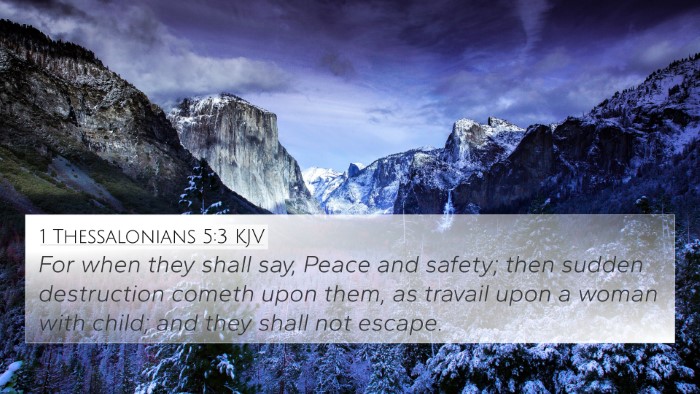Understanding Jeremiah 8:15
Verse: "We looked for peace, but no good came; and for a time of health, and behold trouble!" (Jeremiah 8:15)
Summary of the Verse
This verse encapsulates the despair and hopelessness expressed by the people of Judah as they suffer the consequences of their unfaithfulness to God. They long for peace and wellbeing but find only turmoil instead.
Commentary Insights
- Matthew Henry: Henry emphasizes the futility of the people’s expectations for peace amidst their sinfulness. He argues that true peace can only be found in obedience to God. The people’s choice to ignore divine warnings has left them in a state of chaos, where their desires are unmet.
- Albert Barnes: Barnes points out that the people's realization of their plight highlights a broader spiritual truth—that apart from God's guidance, what they seek remains elusive. He suggests that in their longing, they reflect a desire for reconciliation with God that is not fulfilled due to their persistent rebellion.
- Adam Clarke: Clarke expands upon the emotional depth in this verse, noting how the people are experiencing acute sorrow and disappointment. He reflects on the prophetic message which warns about the coming judgment, suggesting that they are experiencing the just consequences of their actions, thereby linking their current state to their past behaviors.
Bible Verse Cross-References
Understanding Jeremiah 8:15 can be enriched by linking it with the following related Bible verses:
- Isaiah 48:22: "There is no peace, says the Lord, for the wicked."
- Jeremiah 6:14: "They have healed the hurt of the daughter of my people slightly, saying, Peace, peace; when there is no peace."
- Ezekiel 13:10: "Because, even because they have seduced my people, saying, Peace; and there was no peace; and one built up a wall, and lo, others daubed it with untempered morter."
- Micah 3:5: "Thus says the Lord concerning the prophets that make my people err, that bite with their teeth, and cry, Peace; and he that puts not into their mouths, they even prepare war against him."
- James 3:18: "And the fruit of righteousness is sown in peace of them that make peace."
- Romans 5:1: "Therefore being justified by faith, we have peace with God through our Lord Jesus Christ."
- Philippians 4:6-7: "Be careful for nothing; but in every thing by prayer and supplication with thanksgiving let your requests be made known unto God. And the peace of God, which passes all understanding, shall keep your hearts and minds through Christ Jesus."
- Ephesians 2:14: "For he is our peace, who hath made both one, and hath broken down the middle wall of partition between us."
Thematic Connections
The themes of hope and despair in Jeremiah 8:15 resonate throughout Scripture. The interconnectedness of these themes reveals a broader narrative:
- The longing for peace, which is a repeated theme in the Prophets.
- The failure to achieve peace through human efforts, as seen in various scriptures.
- The promise of true peace found in the New Testament through Christ.
Tools for Bible Cross-Referencing
For deeper understanding, utilizing bible concordance and bible cross-reference guides can enhance your study:
- Bible Concordance: Helps in identifying specific themes and verses.
- Bible Cross-Reference Systems: Provide a structured way to connect verses across the Bible.
- Bible Reference Resources: Include commentaries and theological texts that provide context.
- Bible Chain References: Allow for a thorough exploration of related scriptures.
Comparative Analysis
When conducting a comparative analysis of Bible verses related to Jeremiah 8:15:
- Focus on the prophetic literature to understand the nature of God’s warnings.
- Explore connections between Old and New Testament themes of sin, judgment, and grace.
- Consider how the Gospel of Jesus Christ fulfills the promise of peace lacking in the Old Covenant.
Conclusion
Jeremiah 8:15 serves as a poignant reminder of the consequences of turning away from God. By examining its meaning through various commentaries, identifying cross-references, and understanding thematic connections, we are better equipped to grasp the gravity of spiritual disobedience and the hope found in Christ.
Through intentional cross-referencing Biblical texts and studying the connections between Bible verses, believers can draw closer to the heart of God and find the peace that surpasses all understanding.







